I'm storing string prefixes in my SQL Server table, I'm wanting to see if any of those values are a valid prefix for a given parameter value.
e.g. supposing I have a telephone do-not-call list and it includes an entry to prohibit all phone calls to numbers starting with "1425123", rather than inserting 10000 numbers (14251230000 to 14251239999) it stores the prefix instead.
Like so:
CREATE TABLE Prefixes (
Value varchar(10)
)
CREATE INDEX IX_Value UNIQUE Prefixes ( Value )
Evaluated like so:
DECLARE @value varchar(10) = 'foobar'
SELECT
*
FROM
Prefixes
WHERE
@value LIKE ( Value + '%' );
When I run this in Azure SQL in SQL Server Management Studio it says it's performing an Index Scan. With approximately 70,000 entries on an Azure SQL S1 database the query takes between 200 and 500ms to execute. The tooling does not suggest any improvements to indexes for faster performance.
For comparison, an exact equality match (Value = @value) uses an Index Seek and happens near instantly.
200-500ms is too slow for my application.
One option is to move the lookup into my application code using a Trie for an efficient prefix search (which introduces synchronization problems), but another approach is to change the query to something like this:
DECLARE @v1 varchar(1) = LEFT( @value, 1 )
DECLARE @v2 varchar(2) = LEFT( @value, 2 )
DECLARE @v3 varchar(3) = LEFT( @value, 3 )
DECLARE @v4 varchar(4) = LEFT( @value, 4 )
DECLARE @v5 varchar(5) = LEFT( @value, 5 )
DECLARE @v6 varchar(6) = LEFT( @value, 6 )
DECLARE @v7 varchar(7) = LEFT( @value, 7 )
DECLARE @v8 varchar(8) = LEFT( @value, 8 )
DECLARE @v9 varchar(9) = LEFT( @value, 9 )
SELECT
*
FROM
Prefixes
WHERE
Value = @v1 OR
Value = @v2 OR
Value = @v3 OR
Value = @v4 OR
Value = @v5 OR
Value = @v6 OR
Value = @v7 OR
Value = @v8 OR
Value = @v9
When I run this, it's a lot quicker (using an Index Seek) but it feels like a hack, but because I know the length is less than 10 characters I'm okay with it... for now.
Is there a better way? Is there a way SQL Server could do my prefix matching internally (i.e. using the same logic in my final example but without using repetitive and brittle SQL)?
